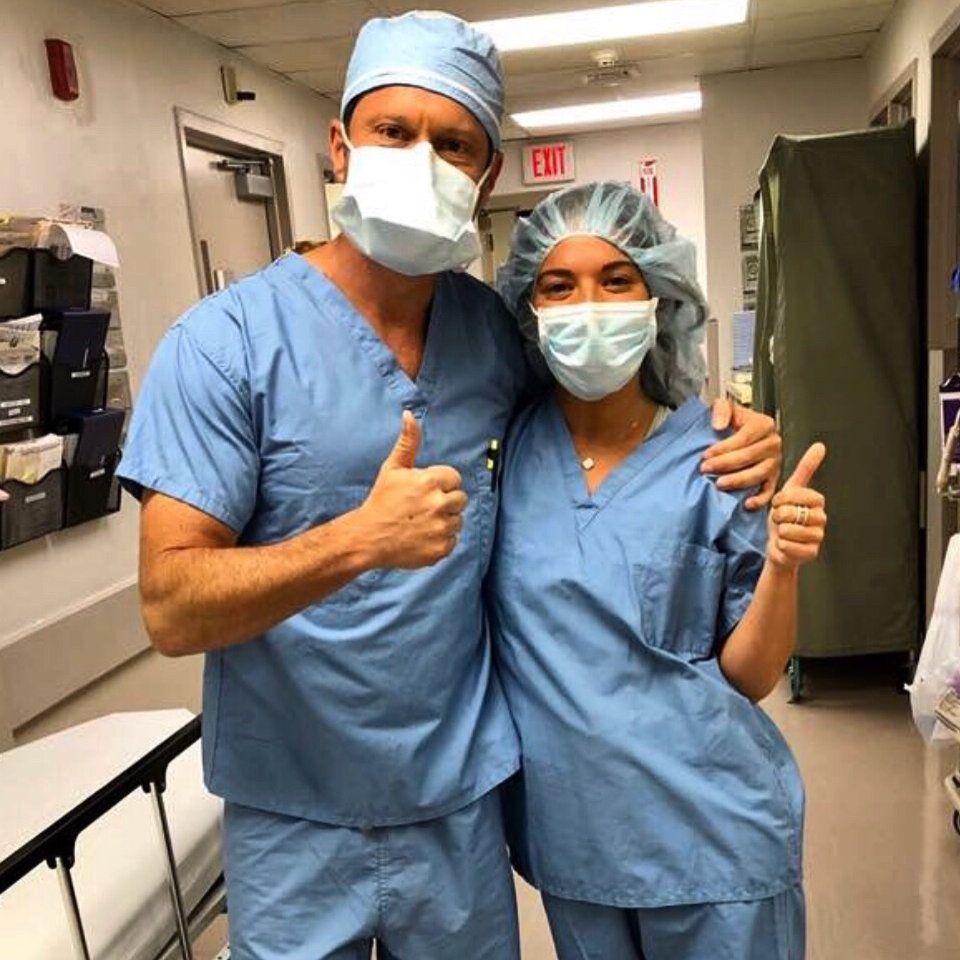When blood vessels in the nasal mucosa rupture, resulting in bleeding from the nose, it’s known medically as epistaxis–a common condition that affects an estimated 60% of the population at some point in their lives. While most nosebleeds are minor and self-limiting, recurrent or severe episodes may indicate underlying issues that require specialized care. At Integrative ENT, Dr. Michael Cohen formed a dedicated team of specialists trained to diagnose and manage epistaxis at his Long Island practice, , offering personalized care for both children and adults. Whether you experience occasional bleeding or frequent, hard-to-control episodes, our board-certified providers use advanced diagnostic tools and targeted treatments to deliver long-term relief and prevent recurrence.

Specialized Approach to Nosebleed Management
Dr. Michael Cohen brings over 25 years of expertise and leads a team of ENT providers specializing in diagnosing and treating epistaxis. As a board-certified otolaryngologist recognized as a Top Doctor by NY Top Docs for 25 consecutive years, he provides expert care alongside his team, offering advanced diagnostic and treatment approaches for both common and complex nosebleed cases.
“While most people experience occasional nosebleeds that resolve with simple pressure, recurring or severe episodes warrant proper evaluation,” explains Dr. Cohen. “By identifying the specific bleeding source and any contributing factors, we can provide targeted treatments that not only stop active bleeding but help prevent future episodes.” This comprehensive approach addresses both immediate concerns and long-term management of this common but sometimes troubling condition.
Understanding the Types and Causes of Epistaxis
Nosebleeds are typically categorized based on their location within the nasal cavity:
Anterior Epistaxis: Originating from the anterior nasal septum, particularly Kiesselbach’s plexus (a network of blood vessels in the front portion of the septum), these account for approximately 90% of nosebleeds. Anterior bleeds typically drain out through the nostrils and are generally easier to control.
Posterior Epistaxis: Occurring further back in the nasal cavity, these bleeds involve larger vessels such as the sphenopalatine artery or its branches.
Posterior epistaxis often presents with blood draining down the throat rather than from the nostrils and may be more difficult to control, sometimes requiring specialized intervention.
RhinAer | Chronic Runny Nose Treatment

RhinAer, chronic runny nose treatment, shows significant improvements in chronic runny nose, post-nasal drip, congestion, and other symptoms. Is RhinAer right for you?
Common Causes and Risk Factors for Nosebleeds
Multiple factors can contribute to the development of nosebleeds:
Environmental Factors
Low humidity, especially during winter months, leads to drying and cracking of nasal mucosa, increasing susceptibility to bleeding.
Traumatic Causes
Direct nasal trauma, excessive nose blowing, digital manipulation (nose picking), or foreign bodies can damage blood vessels.
Structural Abnormalities
Deviated septum, septal perforations, or prominent blood vessels near the mucosal surface can predispose to epistaxis.
Medications
Anticoagulants, aspirin, NSAIDs, and certain supplements can increase bleeding tendency and complicate management of nosebleeds.
Systemic Conditions
Hypertension, blood disorders, liver disease, and certain vascular abnormalities may manifest with recurrent or severe epistaxis.
Inflammatory Conditions
Allergic rhinitis, sinusitis, and other inflammatory nasal conditions can increase mucosal fragility and vascularity.
Understanding the specific type and underlying causes of epistaxis is crucial for effective management and prevention of recurrence.
Common Nosebleed Scenarios Requiring Professional Care
While many nosebleeds resolve with basic first aid, certain situations warrant specialized evaluation and treatment:
Recurrent Episodes
Multiple nosebleeds occurring over weeks or months, even if each individual episode is minor, may indicate an underlying issue requiring treatment.
Severe Bleeding
Heavy or prolonged bleeding that doesn’t respond to 15-20 minutes of appropriate pressure, or causes light-headedness or fatigue, requires immediate medical attention.
Posterior Bleeds
Nosebleeds where blood primarily flows down the throat rather than out the nostrils may involve larger vessels and typically need professional management.
Post-Traumatic Bleeding
Epistaxis following significant nasal trauma may be associated with other injuries requiring comprehensive evaluation.
Bleeding with Anticoagulant Use
Patients taking blood thinners who experience nosebleeds often need specialized management strategies to balance bleeding risk with medication needs.
Pediatric Nosebleeds
Recurrent bleeding in children may indicate various concerns from simple irritation to the presence of foreign bodies or other conditions requiring attention.
Post-Surgical Bleeding
Epistaxis following nasal or sinus surgery requires prompt evaluation to determine whether it represents expected post-operative oozing or a complication needing intervention.
Comprehensive Diagnostic and Treatment Approach for Epistaxis
Dr. Cohen and his team employ a comprehensive approach to epistaxis management:
Thorough Evaluation
Each patient receives a detailed assessment to identify the specific cause of their nosebleeds:
- Nasal Endoscopy: Using specialized equipment with magnification and illumination, our ENT specialists carefully examine the nasal passages to identify bleeding sites, abnormal vessels, or structural issues contributing to epistaxis.
- Medical History Review: A comprehensive review of medications, previous bleeding episodes, family history of bleeding disorders, and other relevant medical conditions helps identify contributing factors.
- Laboratory Assessment: When appropriate, blood tests may be ordered to evaluate clotting function, platelet counts, or other hematologic parameters.
Active Bleeding Management
For patients experiencing acute epistaxis, Dr. Cohen and his team offer several interventions:
- Advanced Cauterization: Precise cauterization of bleeding vessels using silver nitrate, electrocautery, or laser techniques that target specific vessels while minimizing damage to surrounding tissue.
- Nasal Packing: When necessary, specialized packing materials designed for comfort and effectiveness may be placed to apply direct pressure to bleeding sites. Modern materials are significantly more comfortable than traditional packing methods.
- Endoscopic Vessel Control: For posterior bleeds or those not responsive to simpler measures, endoscopic approaches allow for direct visualization and control of the bleeding source.
Preventive and Long-term Management
For patients with recurrent epistaxis, our ENT team develops customized prevention strategies:
- Environmental Modifications: Specific recommendations for humidification, nasal moisturization, and other environmental adjustments to prevent mucosal drying.
- Medical Management: Treatment of underlying conditions such as allergic rhinitis, hypertension, or inflammatory nasal disorders that contribute to bleeding risk.
- Preventive Procedures: For patients with identified abnormal vessels or recurrent bleeding sites, preventive cauterization or other interventions may be recommended to reduce future episodes.
- Pediatric Management: Our team uses gentle, age-appropriate care techniques to effectively treat children with recurrent nosebleeds.
Specialized Interventions for Complex Cases
For cases of severe or recurrent epistaxis that don’t respond to standard treatments, Dr. Cohen and his surgical team offer advanced interventions:
Endoscopic Sphenopalatine Artery Ligation
This minimally invasive procedure targets the primary artery supplying the nasal cavity:
The procedure is performed through the nasal passages using endoscopic guidance, with no external incisions required. Using specialized instruments, Dr. Cohen identifies and carefully clips or cauterizes the sphenopalatine artery where it enters the nasal cavity.
This technique has a success rate exceeding 95% for controlling severe posterior epistaxis and can be performed on an outpatient basis with minimal recovery time. By directly addressing the arterial blood supply, it offers definitive management for patients with severe or recurrent posterior bleeding.
Septal Surgery for Structural Contributors
When structural abnormalities contribute to recurrent bleeding:
For patients with septal deviations, perforations, or spurs that contribute to epistaxis, surgical correction may be recommended. These procedures address the underlying anatomical issues while simultaneously treating any prominent vessels in the affected area.
Modern techniques allow for these interventions to be performed with minimal downtime and discomfort, often providing long-term resolution of recurrent bleeding issues.
What to Expect During Recovery
Following epistaxis treatment, Dr. Michael Cohen and his team provide comprehensive guidance for optimal recovery:
After Office Procedures
Most nasal cauterization and simple packing procedures have straightforward recovery:
- Short-term Changes: The treated area may form a small scab that should be left undisturbed to allow proper healing. Mild discomfort or pressure sensations typically resolve within 24-48 hours.
- Nasal Care: Specific instructions for gentle nasal hygiene, including appropriate moisturization techniques that support healing without disrupting cauterized areas.
- Activity Modifications: Temporary recommendations to avoid strenuous activity, heavy lifting, hot showers, and other factors that might increase nasal blood flow during the initial healing period.
Following More Extensive Interventions
After procedures such as arterial ligation or septal surgery:
- Initial Recovery Period: Most patients return home the same day with specific care instructions. Pain is typically mild to moderate and well-controlled with prescribed medications.
- Follow-up Care: Scheduled visits allow Dr. Cohen to monitor healing, remove any non-absorbable materials, and adjust treatment plans as needed.
- Long-term Management: Personalized strategies for preventing recurrence, which may include environmental modifications, medication adjustments, or ongoing nasal care routines.

Frequently Asked Questions About Epistaxis
Apply firm pressure to the soft part of the nose (just below the bony bridge) for a full 15 minutes without checking if the bleeding has stopped. Leaning slightly forward and breathing through the mouth helps prevent blood from draining down the throat.
Seek emergency care if bleeding doesn’t stop after 20 minutes of proper pressure, if the bleeding is extremely heavy, if you feel light-headed or weak, if you’re having difficulty breathing, or if the nosebleed follows significant head trauma.
While most nosebleeds are benign and self-limiting, they can occasionally indicate underlying health concerns, particularly if they’re frequent, severe, or occur without obvious cause. Significant blood loss from epistaxis is rare but possible with severe cases.
Yes, allergic rhinitis can contribute to epistaxis through increased inflammation, nasal dryness from mouth breathing, and physical trauma from frequent nose blowing or rubbing. Proper allergy management often reduces nosebleed frequency.
Not necessarily. Dr. Cohen works closely with your prescribing physician to balance the benefits of anticoagulation with nosebleed management. Often, local treatments can control epistaxis while maintaining necessary anticoagulation therapy.
With proper identification of the bleeding source and contributing factors, success rates are high. Targeted cauterization resolves approximately 80-90% of anterior nosebleeds, while arterial ligation procedures have success rates exceeding 95% for posterior epistaxis.
Yes, our ENT specialists have extensive experience treating pediatric patients with epistaxis, using age-appropriate approaches and techniques that minimize anxiety while effectively addressing the bleeding source.
Why Choose Integrative ENT for Epistaxis Treatment
Led by Dr. Michael Cohen, the team at Integrative Ear, Nose & Throat provides exceptional care for patients experiencing nosebleeds – ranging from routine cases to complex, recurrent epistaxis:
- Expertise in precise identification and treatment of specific bleeding sources
- Advanced endoscopic techniques for both diagnosis and intervention
- Comprehensive approach addressing immediate bleeding control and long-term prevention
- Special attention to patient comfort throughout evaluation and treatment
- Recognition of Dr. Cohen as a Top Doctor by NY Top Docs for 25 consecutive years
Patients value our thorough evaluations, compassionate care, and personalized plans that go beyond symptom control to address the underlying causes of chronic nosebleeds. Our approach combines immediate relief with long-term prevention strategies to reduce recurrence and improve quality of life.
Expert Nosebleed Care for Residents of Long Island
Whether you’re experiencing recurrent minor nosebleeds or more serious epistaxis episodes, specialized care is available close to home. Dr. Cohen and the specialized team at Integrative Ear, Nose & Throat provide comprehensive evaluation and effective treatment options for patients throughout Nassau and Suffolk counties.
With convenient locations in both Syosset and Port Jefferson Station, expert nosebleed management is readily accessible.
Contact our office today to schedule your consultation and take the first step toward resolving this common but sometimes troubling condition.